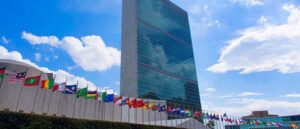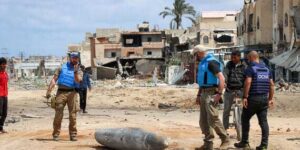
Armed Conflicts, Civil Society, Climate Change, Conferences, Democracy, Economy & Trade, Environment, Featured, Global, Headlines, Human Rights, TerraViva United Nations

Credit: United Nations
– A cascade of crises endangers our world. Wars conducted without rules, governance devoid of democratic principles, surge in discrimination against women and excluded groups, accelerating climate change, greed-induced environmental degradation and unconscionable economic deprivation in an age of excess are threatening to roll back decades of human progress made by the international community.
This September’s UN Summit of the Future presents a rare opportunity to address these challenges through greater participation in UN decision making. World leaders are convening later this month in New York to agree a Pact for the Future, expected to lay the blueprint for international cooperation in the 21st century.
But civil society’s efforts to ensure an outcome document fit for today’s needs are coming up against diplomatic posturing between powerful states intent on preserving the status quo.
State-centric decisions
The world has changed dramatically since the UN was established in 1945, when a large swathe of humanity was still under colonial yoke. Since then, significant strides have been made to advance democratic governance around the world. Yet decision-making processes at the UN remain stubbornly state-centric, privileging a handful of powerful states that control decisions and key appointments.
Civil society has presented the Pact of the Future’s co-facilitators, the governments of Germany and Namibia, with several innovative proposals to enable meaningful participation and people-centred decision-making at the UN. Proposals include a parliamentary assembly representative of the world’s peoples, a world citizen’s initiative to enable people to bring issues of transnational importance to the UN and the appointment of a civil society or people’s envoy to drive the UN’s outreach to communities around the world. However, these forward-looking proposals have found no traction in various drafts of the Pact, which is being criticised for lacking ambition and specificity.
It’s no surprise that diplomatic negotiations on the Pact between country representatives are being bogged down by arguments over language. As a result of diplomatic wrangling, the draft’s provisions are mostly generic and repetitive.
This is unfortunate, as civil society representatives have spent considerable time and energy over the course of the past year in engaging with Summit of the Future processes. Despite tight deadlines, civil society organisations came together at short notice to submit comprehensive recommendations on the Pact’s successive drafts. Hundreds of civil society delegates participated at considerable expense in the much-anticipated Civil Society Conference in Nairobi, designed to gather inputs to feed into the Summit outcomes.
Overall, the gains made so far have been few. These include broad commitments to reform the UN Security Council and international financial institutions. A significantly positive aspect of the Pact’s draft is a commitment to strengthen the UN’s human rights pillar; many of us in civil society rely on this to raise concerns about egregious violations. However, deep-seated tensions among member states in New York have led to the regrettable removal of references to human rights defenders, who play a crucial role in protecting and promoting human rights. This is evident in the recent Revision 3 draft of the Pact released on 27 August.
Strengthening human rights
Tellingly, the human rights pillar receives roughly five per cent of the UN’s regular budget, forcing any new initiatives to rely on underfunded voluntary contributions. This needs to change. The human rights pillar needs to be strengthened. Doing so would help make each of the three UN’s pillars – the others being peace and security and sustainable development – more strongly connected and mutually reinforcing.
To strengthen the human rights pillar, we outline five priority areas for action.
First, substantial resources should be allocated to the UN’s independent thematic and country-focused human rights experts, who enhance civil society’s impact but are forced to get by on shoestring budgets. Due to limited funding from the UN, the experts are compelled to rely on voluntary contributions to support their vital activities.
Second, an accessible and transparently managed pooled fund should be created to enable better participation by civil society in UN meetings. Many smaller civil society organisations, particularly from the global south, find it extremely challenging to cover the costs of participation in key UN arenas.
Third, accountability measures should be strengthened to ensure follow-up in cases of reprisals against people for engaging with UN human rights mechanisms. The UN’s latest reprisals report shows that reprisals have taken place against over 150 individuals in more than 30 states. This needs to be addressed immediately.
Fourth, the UN’s investigative capacities in relation to war crimes, crimes against humanity and genocide should be strengthened to ensure justice for victims. The need for this has been made tragically clear by the resurgence of authoritarian rule and military dictatorships around the world, coupled with egregious rights violations in conflicts in the Occupied Palestinian Territories, Myanmar, Sudan, Ukraine, Yemen and others.
Finally, the human rights pillar can be supported by ensuring implementation of the UN’s guidance note on civic space. This urges the protection of civil society personnel and human rights defenders from intimidation and reprisals, the facilitation of meaningful and safe participation in governance processes and the promotion of laws and policies to support these goals.
The role human rights defenders and civil society activists play in ensuring peaceful resolution of conflicts, addressing gender-based violence and promoting economic justice – among many other vital issues – is crucial. In calling to strengthen the human rights pillar, the Pact’s pen holders recognise the importance of human rights approaches. They must extend this recognition to include people’s and civil society participation. Failing to do so will result in a missed opportunity to create a transformative UN 2.0 that places people and rights at the centre.
Jesselina Rana is UN advisor at CIVICUS, the global civil society alliance. Mandeep Tiwana is chief of evidence and engagement at CIVICUS plus representative to the UN in New York.
















